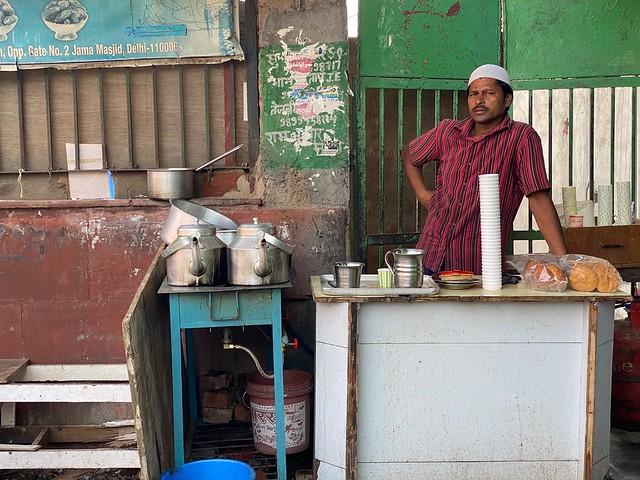
City Food – Chai Stall by the Twin Sufi Shrines, Old Delhi

A picturesque tea stall.
[Text and photos by Mayank Austen Soofi]
A new tea stall has opened. This is a miracle.
The globe is in lockdown. The ongoing coronavirus pandemic is forcing big and small businesses to shut down across the world. Many of us have lost their jobs. Those who are still employed cannot take this status for granted. Everything is uncertain.
Amid this gloom, a small ray of hope is sparkling in the form of a chai shop.
“I started it a week ago,” says Lal Babu Ansari. The new stall is situated in a most extraordinary location. It stands outside the east-facing gateway of the Mughal-era Jama Masjid monument, in Old Delhi. The stall is almost attached to the outer wall of the twin Sufi shrines of Hazrat Hare Bhare Shah and Hazrat Sarmad Shahid. The establishment is extremely modest however—just a rickety table crowded with a gas burner, two kettles, pans half-filled with milk, a bowl of sugar and a few jars crammed with tea things like fen and rusks.
Mr Ansari concedes it is unusual to start a new business in these grim times. “Earlier, I was working in the tea stall under that peepal,” he says, vaguely gesturing towards a handful of trees some distance away. The owner hasn’t reopened that stall yet, and Mr Ansari eventually decided to launch his own. “I have to earn after all.”
At this early hour, the stall is empty. In fact the entire area is empty save for a couple of devotees inside the shrine. “Nobody is coming to the stall so far,” admits Mr Ansari. He says he gets ikka dukka grahak (occasional clients) every hour. “This is the way things are right now.” Sometimes, visitors to the adjacent Sufi shrines stop by his stall on their way out “but very few devotees are arriving to seek blessings these days, and most of them don’t want to remove their face mask… so they chose to ignore my chai.”
A native of Patna in Bihar, Mr Ansari is in his 30s and spent almost all his life in Delhi working through a series of tea stalls. But “this is my life’s first stall that I own,” he informs matter-of-factly.
Gesturing towards a market in the narrow lane ahead, where clothes and sandals stalls on either sides are shrouded in yellow and blue plastic sheets, he says that some of those stalls would open later in the day — but they are hardly receiving any customers.
In the BC (before corona) era, this stretch of the Walled City would be over-crowded by this time with food stalls selling kebabas, Roohafza drinks and biryanis. In fact, a popular biryani hawker would be seen supervising his cooks and cauldrons in an open ground nearby. The gates to the ground are locked. Mr Ansari’s stall is actually stacked right against those gates.
Right now, it is totally silent. Another tea shop nearby has been closed ever since the lockdown began.
Minutes pass and no customer arrives. Then a long-haired fakir appears and sits on the pavement beside a stray dog. He asks for chai and becomes the day’s first patron. The stall opens daily from 8 am to 9 pm.
Amid despair, a new hope
1.
2.
3.
4.
5.
6.







Recent Comments